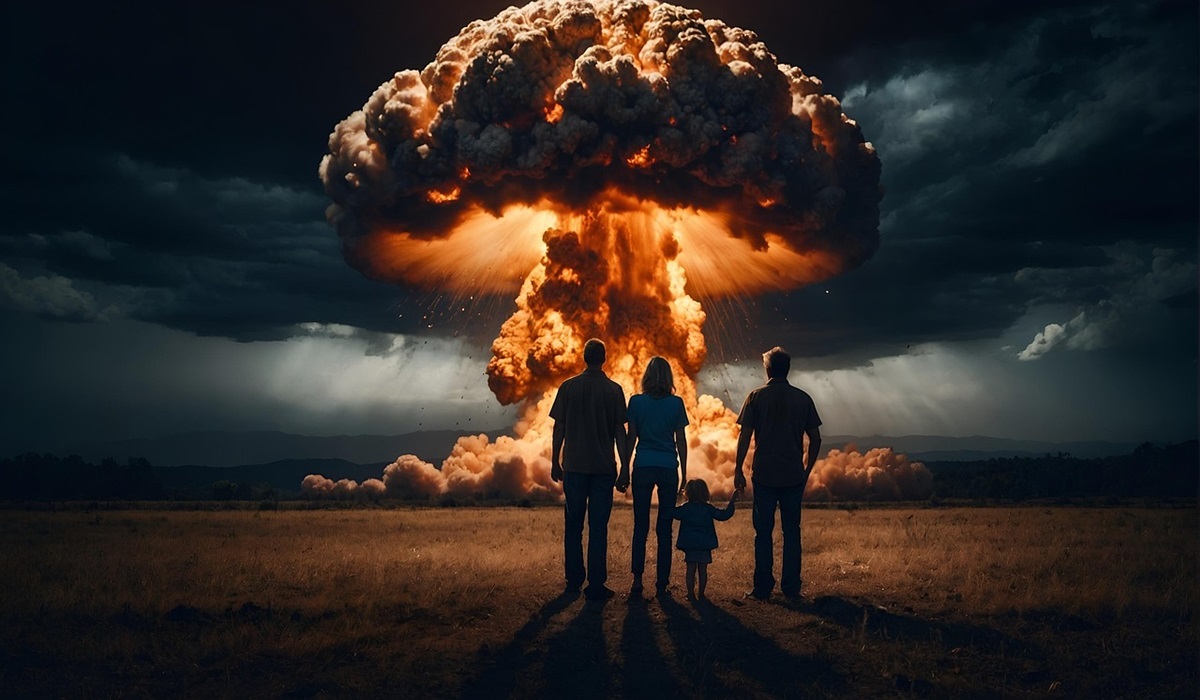The Paradox of Deterrence: Israel, the United States, and the Hypocrisy of Nuclear Power
- TDS News
- Trending News
- June 13, 2025

Image Credit,Geralt
By any standard of logic, morality, or international law, the doctrine of nuclear deterrence remains one of the most paradoxical and disturbing pillars of global security. It is a philosophy built on the premise that peace is best preserved through the omnipresent threat of annihilation. This madness has been dressed in academic rigor, strategic justification, and patriotic soundbites—but strip it to its bones, and deterrence is a calculated gamble with human extinction as the losing bet.
Let us begin with a brutal truth: the only country to ever use nuclear weapons in war is the United States. Twice. Hiroshima and Nagasaki weren’t warnings—they were executions. Justified by military strategists as necessary to end World War II and save lives, these bombings left hundreds of thousands dead and generations scarred by radiation. That was 1945. Since then, the U.S. has positioned itself as the moral gatekeeper of nuclear weapons, preaching nonproliferation while maintaining one of the largest and most advanced arsenals on Earth.
Now zoom out to the present moment. Israel, a nuclear power by all reasonable accounts—even if it has never officially confirmed it—has just carried out a preemptive strike on Iran. The rationale? To prevent Iran from acquiring the very same type of nuclear capability Israel already possesses. This is not deterrence. This is domination. This is the arrogant choreography of empire, where some nations claim the right to destroy while denying others the right to defend.
The United States’ long-standing support for Israel’s military actions—whether overt or covert—makes this dance even more grotesque. Washington may claim plausible deniability, insisting it had “nothing to do” with Israel’s unilateral attack. But this is theater. America’s military aid, political cover, and intelligence-sharing have made such operations possible. Without U.S. backing, Israel would not enjoy the near impunity it has in the international arena.
So here lies the core of the hypocrisy: nuclear deterrence only works as a concept among countries that already have the bomb. The U.S., Russia, China, France, Britain—these powers coexist in a fragile but relatively stable standoff because they know that any nuclear aggression would provoke mutual assured destruction (MAD). It is a suicidal equilibrium that, bizarrely, maintains peace.
But this club is exclusive. When Iran, North Korea, or even hypothetical future African nuclear states seek to enter it, suddenly the game changes. Deterrence for them is called “provocation.” Their self-defense becomes a threat to global order. Their pursuit of nuclear technology is treated as illegitimate, destabilizing, or even insane. Why?
Because the truth is that deterrence is not universal. It’s a weapon of hierarchy. It preserves a global caste system where power is hoarded by a few and violently denied to the many.
The American-led war in Iraq was based on the lie of weapons of mass destruction. Saddam Hussein had no nuclear program when U.S. forces invaded and toppled his regime. That precedent was not lost on Iran, or on any other nation that has been targeted by the West. The lesson was clear: if you don’t have a nuclear deterrent, you can be invaded, sanctioned, regime-changed, or assassinated.
Libya under Gaddafi gave up its nuclear ambitions in exchange for Western favor. A few years later, the country was plunged into chaos by NATO bombs. Syria was accused of pursuing nuclear capabilities and promptly engulfed in war. The pattern is impossible to ignore: giving up nuclear weapons does not make you safer—it makes you vulnerable.
Now consider this: what if every nation had nuclear weapons? What if Iran did acquire the bomb, and North Korea continued to expand its arsenal, and a united Africa, rising from centuries of colonization and extraction, built its own nuclear shield? Would that truly make the world more dangerous?
Or would it finally level the playing field?
It may sound heretical to say so, but history suggests that nuclear parity is the only thing that stops nuclear war. The nations that have nuclear weapons don’t get invaded. They don’t suffer regime change at the hands of NATO. They are treated with caution, if not respect. They sit at tables where others are not allowed. That’s the real function of the bomb—not as a weapon of last resort, but as a passport to sovereignty.
Let’s be clear: no one should celebrate the existence of nuclear weapons. Their use would be catastrophic. But the current system, where nuclear-armed states lecture the world while flexing their own arsenals and launching “preemptive” strikes, is not sustainable. It is not peace. It is controlled bullying. It is organized coercion disguised as international order.
War is hell. No one wins, except the military-industrial complex and the arms dealers who profit from destruction. Deterrence was supposed to be a last-ditch defense, not a tool of permanent supremacy. Israel’s recent strike on Iran, whether successful or not, underscores the failure of the existing deterrent framework. It shows that when one side holds all the cards, peace is always one heartbeat away from war.
So we must ask the uncomfortable question: if the only way to be safe in this world is to have a nuclear weapon, who really deserves to feel safe?
Because safety, like power, should not be the privilege of the few. It must be the right of all.








